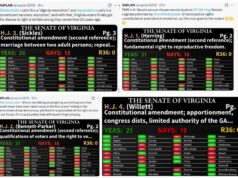by Jonathan Stevens of LAURA PAC and Local Jurisdiction Consulting
Tomorrow is Super Tuesday, the largest single day of voting in the 2020 Democratic Presidential Primary, and millions of voters will go to the polls. More waves of primary elections, presidential, congressional, state and local, will follow. We would expect millions of people to stand in line, wait and vote in rooms will their fellow citizens, and shake hands with campaign and party volunteers on the way in and out of their polling places. That will mean polling places where person after person will use the same machines, tables, booths, and pens to vote. Meanwhile, we likely face a growing outbreak of the new coronavirus disease, Covid-19, as a global pandemic takes hold.
We must protect our elections by tending to citizen safety and minimizing fear that could lead to lower participation, and in the darkest outcomes, tempt those who have followed Donald Trump in rejecting democratic norms to attempt to postpone or cancel elections they fear will not go their way. The risk remains low in most places in the United States at the moment, but tomorrow’s elections are the perfect time to practice basic measures we can all take to stay safe: wash your hands whenever possible and bring sanitizer to use before and after voting; consider nitrile gloves if you want to shake hands and for use while touching pens and equipment used by others; and practice social distancing, where you do not shake hands and remain 6 feet from the nearest person whenever possible.
After tomorrow, however, state legislators must act immediately to provide for running an election during a pandemic. Local electoral boards will need emergency funding to provide protective gear and training in its use to poll workers and volunteers. Israel is conducting elections under biohazard safety protocols today. Any state that does not currently allow no excuse absentee voting by mail must allow it for this election. Polling places can be set up to allow social distancing in lines and check-in areas, and curbside voting, which is allowed for disabled voters in Virginia could be expanded.
All of this will take money, and the political will to face an unpleasant, inconvenient truth: we are in a pandemic, with real risks to the health, livelihoods, and lives of Americans, and an immense risk of the attendant fear damaging our elections at a time when democratic norms are already under siege. Legislators need to act.




![Video: On ACA Subsidies, Fmr. Rep. Tom Perriello (D-VA05) Says Rep. John McGuire (R-VA05) Is “kick[ing] those people [he represents] to the curb…[to] give another tax credit to Elon Musk and Peter Thiel”](https://bluevirginia.us/wp-content/uploads/2026/01/perrielloaca-238x178.jpg)






